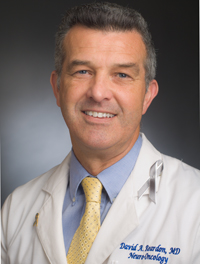More than 600,000 people in the United States are living with a primary brain tumor — one that begins and stays in the brain — and over 60,000 adults and children will be diagnosed with a brain tumor this year.
In recognition of May as Brain Tumor Awareness Month, we asked David Reardon, MD, clinical director of the Center for Neuro-Oncology at Dana-Farber/Brigham and Women’s Cancer Center, for the latest advances in brain tumor research and patient care.
You joined Dana-Farber in 2011, coming from a major brain tumor treatment and research center at Duke. What were your impressions of our brain tumor treatment program?
I knew it was a solid, strong program, but I didn’t realize until I got here just how good it is. We have more to offer patients than just about any place in the country — from basic laboratory research on how brain tumors develop, to advanced surgical capabilities, clinical trials of the newest drugs, and compassionate, patient-centered care to maintain high quality of life.

One strength is the Institute’s dynamic cancer biology and genetics research environment for investigating the cellular and genetic abnormalities that drive the biology of brain tumors. Our researchers are uncovering clues to which genetic factors are involved in tumor development, and they’re finding that stem cells play a role in some brain tumors.
Dana-Farber is in the forefront of personalized cancer care. Many cancer therapists talk about individualizing cancer therapy: At Dana-Farber/Brigham and Women’s Cancer Center, we are doing it by testing patients’ tumor samples for mutated genes that might match up with current or future drugs that target the patient’s specific mutations. We offer the first clinical trials for brain tumor patients that utilize exactly this approach. First, we perform a detailed analysis of an individual patient’s tumor, which takes about a week. Based on the results, we can recommend specific clinical trials that offer the patient the most promise and hope.
The Center for Neuro-Oncology is also leading several collaborations with other brain tumor centers and major pharmaceutical companies. Acting together, we are designing and implementing powerful clinical trials to analyze the genetic abnormalities of patients’ tumors and measure the effectiveness of drugs aimed at those abnormalities.
What are some of the challenges in treating brain tumors that you’re researching?
For one thing, glioblastomas — the most common and aggressive primary brain tumors — are genetically very complex. The tumor cells are driven by multiple abnormal gene pathways, so we’re starting to use combinations of targeted drugs in “cocktails” that can block several pathways at once.
In addition, glioblastoma cells are adept at developing resistance to chemotherapy. We can now measure some enzymes whose levels predict which patients are more likely to develop resistance to a given drug.
One of our key current efforts is to find more abnormal genes in brain tumors that we can target, including molecules located in the “micro-environment” surrounding tumor cells. Such targets include angiogenesis-signaling molecules that recruit blood vessels that feed the tumors. We’ve seen dramatically improved response rates in patients treated with anti-angiogenesis drugs, although resistance is a problem here as well.
Are there any new developments in surgery to remove brain tumors?
Recently, Dana-Farber/Brigham and Women’s Cancer Center opened the Advanced Multimodality Image Guided Operating (AMIGO) suite, which provides the most advanced intraoperative imaging technology anywhere in the world. AMIGO allows our neurosurgeons to directly visualize the tumor and normal brain during an operation, so that they can remove more of the tumor — and do it safely — than is possible without such state-of-the art equipment. This can make a major difference in how patients will do long-term.
Is Dana-Farber active in research on cancer vaccines to treat brain tumors?
Immunotherapy — engaging the body’s immune system to attack tumors — is a promising strategy for treating cancer, including brain tumors. Our scientists are developing vaccines and other methods to bolster the immune system and some of these are available for treating brain tumor patients now. Additional approaches are being carefully developed in the research lab and will be making their way into the clinic soon.
How do you organize care for patients with brain tumors at the center?
The Center for Neuro-Oncology has been caring for brain tumor patients for several decades. We recognize the complex needs of our patients and their caregivers, and we strongly advocate a team approach. Each patient is assigned a physician, a nurse, a nurse practitioner, a psychologist and a social worker, which enables us to provide not just the diagnosis and the treatment, but all the quality-of-life and psychosocial resources needed to best serve patients and their families.
You can learn more about the Center for Neuro-Oncology’s attention to patient care in the story of Kevin Bradley, whose glioblastoma treatment has included five successful years on a clinical trial.

My husband was diagnosed with GBM IV in Feb. 2012. He had a craniotomy in Feb. with STUPP protocol. Recurrence in June, second craniotomy in August, and second recurrence in November. Participated in dendritic cell vaccine clinical trial Aug. Now, his NO has him on Temodar and Avastin. I am not sure if this is the right treatment. It doesn’t make sense to put my husband on Temodar when it didn’t work the first time. I am searching for advice and opinions. My husband feels good. He has no deficits from any of the surgeries, and I am concerned about Avastin being a short-term approach. Appreciate any comments!!!
Hi Robin
Very glad to hear your husband is felling well and neurologically doing so well. In general if tumors are growing despite a specific treatment, that treatment is discontinued and alternatives explored. However, there may be specific circumstances why your husband’s neuro-oncologist elected to resume temodar. I would need to review the records and his scans (and ideally see him in person!) in order to optimally evaluate this further.